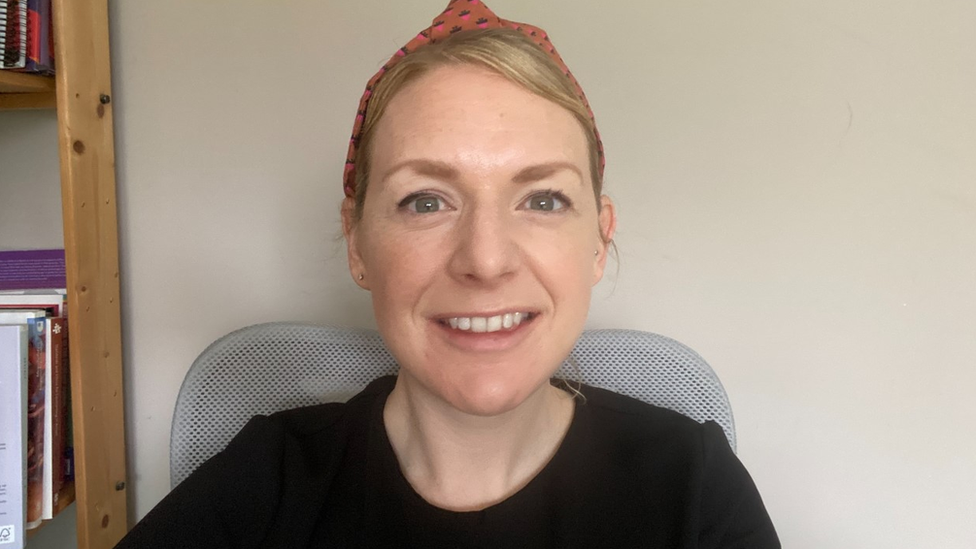NHS wait times 'traumatic' for eating disorder sufferers
- Published

Eating disorder wait times have continued to grow post pandemic. Picture posed by model
Waiting times for those seeking support for eating disorders continue to grow despite lockdown restrictions ending, NHS data shows.
In the last three months of 2021, a record 2,100 children and young people were waiting for treatment.
One eating disorder sufferer described her three-month wait for treatment as "really traumatic".
An extra £79m was put into children's mental health services in 2021, the government said.
Although wait times reached a peak at the end of last year, the demand has not dropped significantly since Covid-19 restrictions were lifted - meaning the backlog that developed during the pandemic has not been reduced.
Sophie - not her real name - waited more than three months for treatment for her anorexia.
"I got so much worse while I was waiting," she said.
"It was really traumatic, especially for my parents who had to help me survive until I got some proper support.
"For a while I didn't fit the criteria for anorexia, which was really hard because it felt like I had to lose even more weight in order to get treatment."
Since starting treatment, Sophie says she has made important progress and has nothing but praise for her therapist and nutritionist.
She added: "Everyone has been brilliant, it's just such a shame it took me so long to get seen because it was just a horrible way to spend those months."

Katie Scott has struggled with her eating disorder since she was 14
Katie Scott, 24, from Berkshire, was diagnosed with an eating disorder aged 14 and spent the following decade in varying stages of treatment and recovery.
Prior to the pandemic she was attending day-patient treatment, but this was moved online when lockdown restrictions were introduced.
She said: "For some people it made it very tricky for the eating disorder not to return, because you had a lot more control [of your own behaviours].
"If you're in a place where you feel strong enough to deal with that and take that control and do it in a recovery-focused, positive way, that's great.
"I'd only been there a month, so I hadn't been there a huge amount of time and therefore didn't feel as confident in making my own decisions that work influenced by the eating disorder, and therefore I found it quite difficult not to fall back a bit."
According to the Local Democracy Reporting Service, demand for eating disorder treatment has risen across England:
Demand in Wigan and Bolton, external rose by 101% between 2020/21 and 2021/22
Referrals for young people with eating disorder doubled in Hertfordshire, external
Barnsley, external eating disorder services saw a rise in referrals, including those needing hospital treatment


Harriet Bibby plays Summer Spellman in Coronation Street
A Coronation Street actress currently at the heart of an eating-disorder storyline has said research for the role highlighted "how hard" it can be for people to seek support.
Harriet Bibby researched the impact of T1DE - Type One Diabetes and Disorder Eating - as part of her portrayal of teenage student Summer Spellman in the long-running ITV soap.
She told the BBC: "When you first get told you're going to do a storyline like this, you think you need to get it right and you want everything to match up with what other people have experienced.
"But quite quickly I learned, from speaking to friends and other people who might have experienced similar things, that no one person's experience is going to be the same."
Harriet said the most surprising element of eating disorders is how secretive they can make the sufferer, and how hard it can be for them to ask for help.
She said: "One thing that shocked me was how skilled people get at hiding what they're going through, and how easy it is to hide something like that.
"There's a sort of stigma around suffering with an eating disorder, and part of it might be ashamed to try to get help."

Martha Williams, a clinical advice coordinator for BEAT - a charity which raises awareness of eating disorders and supports those affected by them - said that the increase in demand for its services has not yet subsided following the pandemic.
She said: "Even now, BEAT is still experiencing twice the demand for its helpline in comparison to before the pandemic.
"I don't think this is anything that is going to go away, or slow down, because so many more people are starting to come forward for support with eating disorders.
"If someone is left for a long time without treatment or support, this could lead to a belief that they are undeserving of treatment or that they're not important.
"This could result in them withdrawing from seeking support and not actually receiving the help that they need, because it can inadvertently give the message that they need to be more unwell to be seen."

BBC Action Line
If you've been affected by eating disorders, help and support is available via the BBC Action Line.

The sense that there is a certain level of illness that needs to be reached in order to access treatment is something Katie said she has also experienced.
"The whole weight criteria that you have to meet to be diagnosed with anorexia is a really, really difficult thing," she said.
"It's very invalidating because I knew that a lot of the behaviours I was doing were associated with anorexia, but I wasn't getting the diagnosis and therefore it set off the whole thing in my head where I was thinking 'am I bad enough, am I just faking it, is there actually nothing wrong with me, am I just doing it for attention?'.
"It was almost like an inadvertent encouragement for my eating disorder behaviours, which was really difficult to deal with."
Martha Williams said: "Although guidelines such as NICE have been updated to advise against using single measures such as body-mass index (BMI) to determine whether to offer eating disorder treatment, we know that this is still a common issue and barrier to accessing treatment."
She added that alongside more funding for eating disorder services, BEAT and other eating disorder charities now want to see "more training, more awareness, more knowledge, more education" to help people identify signs of eating disorders and how to support sufferers.
A spokesperson for the Department of Health and Social Care said: "Eating disorders can be devastating for people living with them, and improving eating disorder services is a vital part of our work to improve mental health services.
"Last year, we invested an extra £79 million to expand children's mental health services, enabling at least 2,000 more children and young people to access eating disorder services.
"We are investing an extra £2.3 billion per year by 2024 to transform mental health services - which includes support for children and young people's eating disorder services, increasing capacity in 70 community support teams across the country."
Related topics
- Published19 May 2022

- Published3 March 2022
